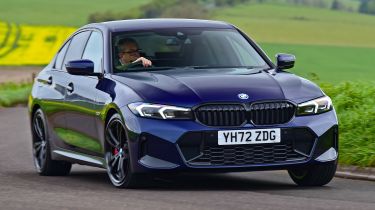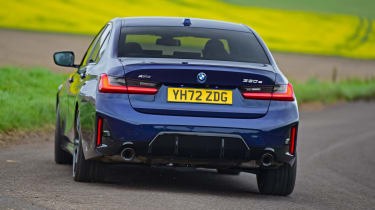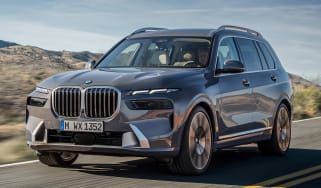BMW 3 Series - Engines, performance and drive
The 3 Series offers class-leading performance along with an improved ride and excellent driving dynamics

The BMW 3 Series has long been the default choice for those looking for an entertaining driving experience from their compact executive saloon. And for the most part, this latest incarnation of the 3 Series retains its crown as being the drivers’ car in the class. However, BMW has also attempted to increase refinement and ride quality to match the Mercedes C-Class. It’s a tough job to retain the 3 Series’ sporting appeal while also raising the bar in the comfort stakes.
Remarkably, BMW seems to have pulled it off, as the 3 Series is still a very entertaining car to drive, with impressive road holding and improved ride quality over its predecessor. Part of this improvement is thanks to BMW’s new stroke-dependent suspension damper technology, which is a standard feature on all models. When the car is carrying a light load, the damping rate is softer, resulting in a compliant ride.
However, when the car is fully laden with passengers and luggage, the damping is stiffer to take into account the heavier load, which results in appreciably better body control without unduly affecting the ride quality. For the most part, it works very well, but part of the improvement in the 3 Series’ ability is also the result of using BMW’s latest CLAR platform. This has reduced weight – by up to 55kg – and increased body rigidity by up to 50 per cent. It’s an impressive feat given the 3 Series is larger than its predecessor.
Used - available now

2022 BMW
3 Series
36,537 milesAutomaticPetrol2.0L
Cash £22,450
2020 BMW
3 Series
38,618 milesAutomaticDiesel2.0L
Cash £19,103
2022 BMW
3 Series
67,585 milesAutomaticPetrol2.0L
Cash £16,111
2022 BMW
3 Series
79,213 milesAutomaticPetrol2.0L
Cash £13,990On the motorway, the 3 Series is an accomplished cruiser, offering lower noise levels than it exhibited previously, partly thanks to the standard fit acoustic glazing. The ride is good too, and while in the past we might have recommended the optional adaptive dampers that can be specified as part of the M Sport Pro pack on M Sport cars, this is no longer necessary thanks to the stroke-dependent dampers. On the largest wheels, there is an occasional thump from the worst potholes, but it’s certainly no worse than its rivals in this respect.
The 3 Series lives up to the driver appeal expected of the model with excellent poise and agility, comfortably beating both the Audi A4 and Mercedes C-Class in this respect. But like its rivals, it does suffer from having slightly lifeless steering that doesn’t offer keen drivers a huge amount of feedback. Despite this, the 3 Series is still a drivers’ car with excellent grip and composure. And while the steering rack lacks feel, it is quick, allowing accurate and rapid corrections to your cornering line. This can be improved by opting for one of the models with BMW’s xDrive four-wheel drive system, which makes the 3 Series even more surefooted no matter the conditions.
Range rationalisation means the six-speed manual has been dropped, and all models now come with an eight-speed ZF automatic. That’s not a major issue in our view because the automatic is an excellent transmission with smooth changes whether the gearbox is left to its own devices or if you change gear manually using the standard steering wheel-mounted paddles.
Keener drivers who don't want to spend over £80,000 on a brand new BMW M3 will be best served by either the M340d or M340i. Both are effortlessly fast and – thanks to standard xDrive four-wheel drive – have loads of grip and traction.
However, it's best to consider this pair as fast, capable cruisers, because they're good to drive but don't feel much different to M Sport models. Adaptive suspension is standard on the M340d and M340i, making for great ride quality if Comfort mode is selected. Things sharpen up in Sport, and while some may find it a little uncomfortable, it offers a marked improvement in dynamics on the right piece of road.
0-62mph acceleration and top speed
The petrol range kicks off with the 182bhp 2.0-litre four-cylinder 320i, which can only be specified with rear-wheel drive (it used to have the option of xDrive four-wheel drive). It manages the 0-62mph run in 7.4 seconds and has a top speed of 146mph.
The plug-in hybrid 330e mixes a 2.0-litre four-cylinder turbocharged petrol engine with an electric motor for a total output of 288bhp and 420Nm; enough for 0-62mph in 5.8 seconds, and a top speed of 143mph in both rear-wheel drive and xDrive four-wheel drive forms. Meanwhile, the sporty M340i has a 3.0-litre straight-six with 369bhp and four-wheel-drive as standard. The 0-62mph dash takes just 4.4 seconds, and it’s limited to 155mph.
The 320d uses a four-cylinder, 2.0-litre diesel engine producing 187bhp. Like the 320i petrol, it comes with an eight-speed automatic and is rear-wheel drive only. It can get from 0-62mph in 6.9 seconds, and has a top speed of 149mph.
Performance-conscious diesel buyers after a straight-six engine must now pay for the M340d xDrive since the demise of the rather excellent (in our opinion) 330d. Still, the 335bhp of this top-of-the-range diesel produces plenty of performance to help us forget the lesser 330d. It can dispatch the sprint in 4.6 seconds, and keeps going up to 155mph.










